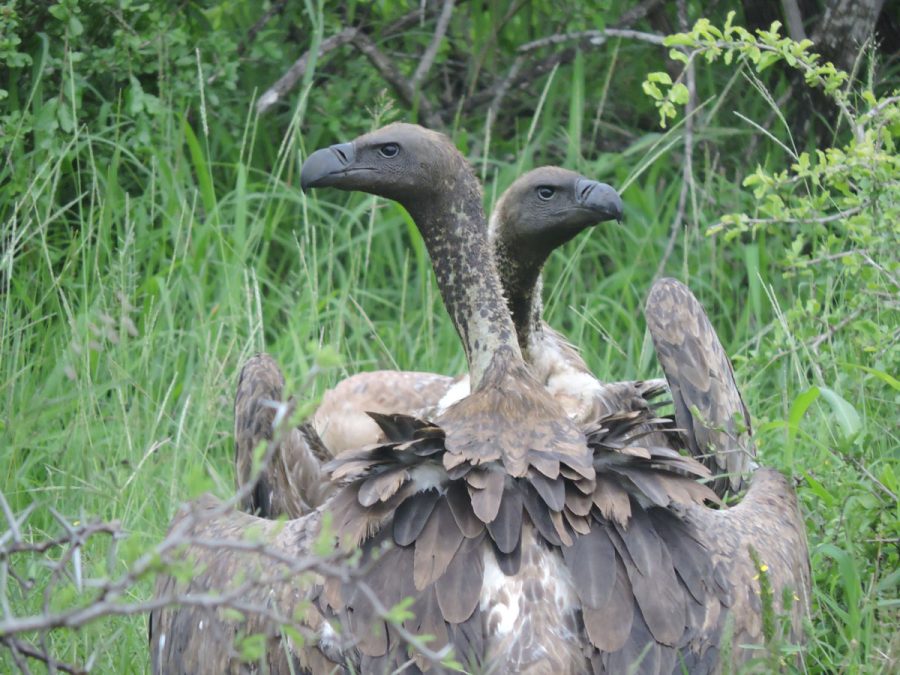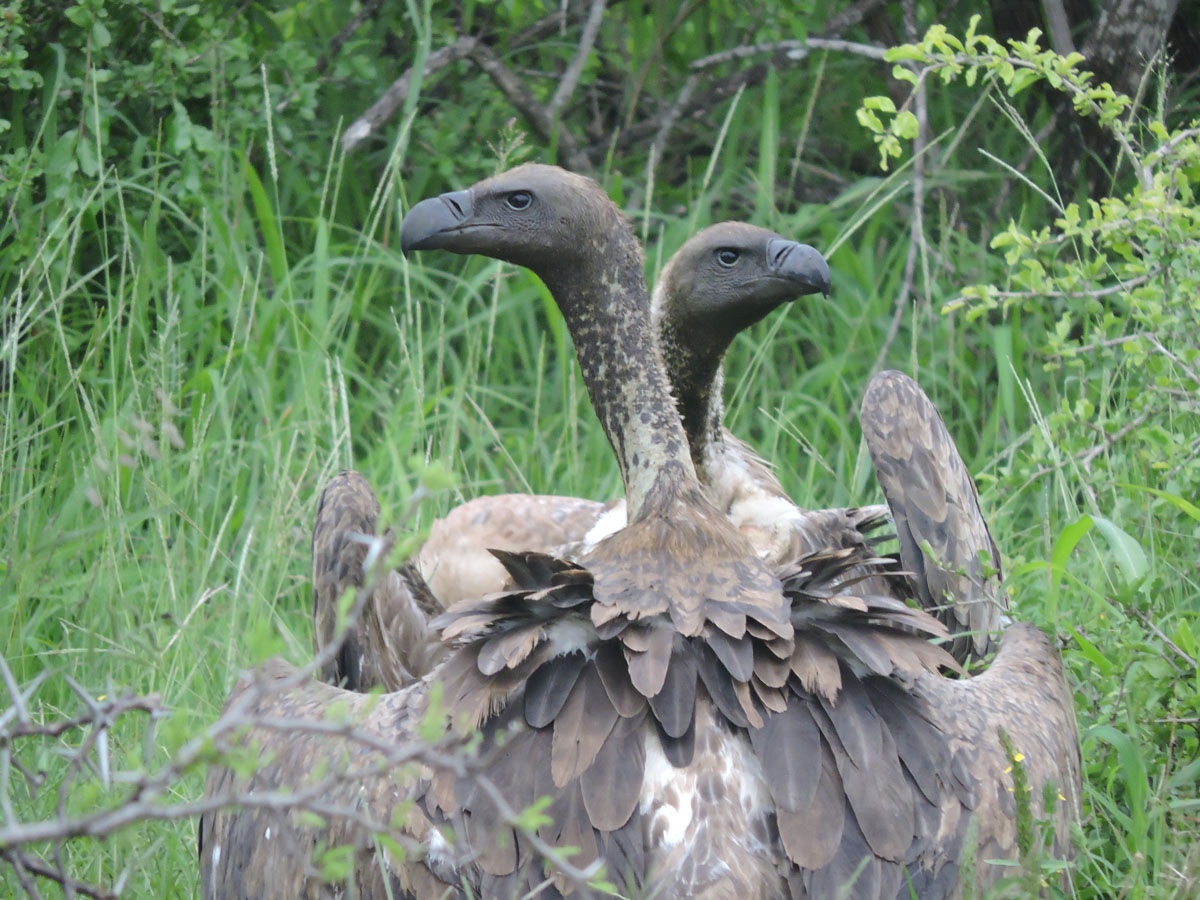
Almost 50 Vultures Killed in Mass Poisoning in Zululand
Forty-seven white-backed vultures have been killed in a mass poisoning incident in KwaZulu-Natal (KZN), South Africa. Another five were injured. One of the key reasons for poisoning of vultures is for use in the traditional medicine trade. The gruesome discovery of the birds – some with their heads removed – was made on Sunday (18 […]

Forty-seven white-backed vultures have been killed in a mass poisoning incident in KwaZulu-Natal (KZN), South Africa. Another five were injured. One of the key reasons for poisoning of vultures is for use in the traditional medicine trade.
The gruesome discovery of the birds – some with their heads removed – was made on Sunday (18 Dec) by Wildlife ACT vulture monitors conducting routine vulture surveillance. It again highlights the precarious situation of vultures in both KZN and South Africa.

Earlier this month, the Department of Forestry, Fisheries and Environment released the Biodiversity Management Plan (BMP) for South African Vultures for public comment. It appears that no sooner had the send button been hit, than this (yet another) shocking vulture poisoning event took place in Zululand.
A criminal case has been instituted
A total of 47 White-backed vulture carcasses, 35 of which had their heads removed and an additional five individuals, which had not yet succumbed to the poisoning, were recovered. Five Tawny Eagle carcasses were also found at the scene.
The five live individuals received initial treatment at the scene before being transported to a permitted rehabilitation facility for further treatment and a criminal case has been instituted with the South African Police Service. The swift response by conservation officials, who have been trained to handle such poisoning events, decontaminated the scene to ensure that no further fatalities occurred.

Vultures face numerous threats
Brent Coverdale, Ezemvelo KZN Wildlife’s Mammal and Bird Scientist stated that one of the key threats facing vultures within South Africa, is the poisoning of vultures for use in the traditional medicine trade, and this is highlighted within the draft Management Plan.
The current spate of such poisonings is unsustainable and will lead to the demise of vultures within South Africa and simultaneously, devastating environmental consequences, and the loss of cultural heritage.

Conservation agencies and the Management plan itself, acknowledge that the Traditional Healers and the associations to whom they belong are a critical stakeholder in the conservation of vultures and thus require them to ensure that the poisoning of vultures is not only frowned upon but any member dealing in products sourced from such events are reported to the authorities.
“The loss of so many vultures from this area is extremely sad and it affects the health of our ecosystem and the livelihoods of our people. As the Gumbi community, we are working hard to establish a conservation-based economy, and illegal activity such as this has a large impact,” says INkosi Gumbi, leader of the local Traditional Authority.
An urgent need for the Biodiversity Management Plan
Ezemvelo KZN Wildlife and its conservation partner, Wildlife ACT, undertake annual monitoring surveys in KwaZulu-Natal and the worrying decline of all tree nesting vultures highlights not only the need for the Management Plan, but that all stakeholders have a responsibility to ensure that their actions are mitigated or avoided at all costs. This includes the conversion to lead free ammunition within the hunting industry, the erection of electrical infrastructure in areas not considered sensitive to vultures and the halting of the illegal use of agricultural pesticides to poison wildlife.
Wildlife ACT’s Chris Kelly noted the willingness of the various stakeholders involved in vulture conservation in supporting the Management Plan, but that such support had to translate into tangible action on the ground. The commenting period for the BMP ends on the 2 January 2023 and members of the public are encouraged to submit comments to ensure that South Africa’s heritage exists into perpetuity.
“Wildlife ACT was extremely saddened by the discovery of this recent mass vulture poisoning. Vultures are a vital component of our ecosystem’s functionality, yet we have seen a drastic decline of the local breeding population over the past few years due to poisoning, despite our best efforts. The time to act is now if we want to protect these species. We urge the public to engage with the BMP commenting process before the deadline,” says Anel Olivier, Wildlife ACT’s Vulture Conservation Programme Manager.
The draft BMP can be accessed here:
https://www.dffe.gov.za/sites/default/files/gazetted_notices/nemba_multispecies.bmp_southafricanvultures_g47632gon2817.pdf
Members of the public urged to submit written comment on the draft Biodiversity Management Plan
Via email to conservationmanagement@dffe.gov.za
Or via post to:
The Director-General: Department of Forestry, Fisheries and the Environment
Attention: Ms Humbulani Mafumo
Private Bag X447
Pretoria
0001
Or by hand at:
Environment House
473 Steve Biko Road
Arcadia
Pretoria
0083
Partners: Wildlife ACT, Ezemvelo KZN Wildlife, Somkhanda Community Game Reserve,
Heligistix, PAMco, Happy Hollow Foundation, Dierenpark and Ford Wildlife Foundation
